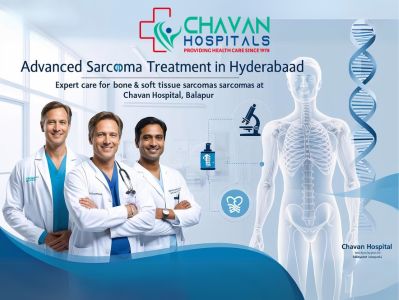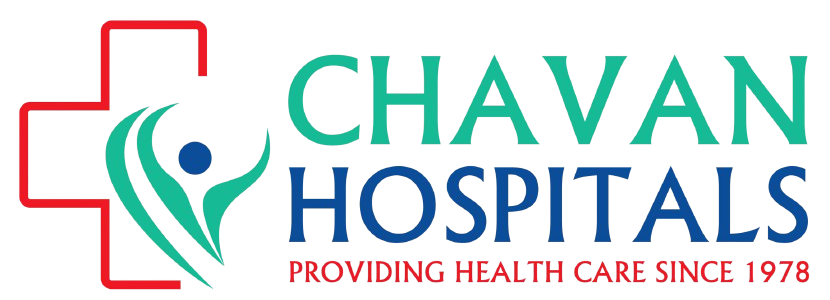- Home
- About us
- Specialities
Superspeciality
- Doctors
- Resources
- Contact us
Sarcoma: Causes, Symptoms, and Treatment Options
Sarcoma
The body’s connective tissues, which comprise bones, muscles, fat, blood vessels, nerves, and other supporting tissues, are the site of the rare and complicated cancer known as sarcoma. Sarcomas are extremely difficult to identify and cure without specialized care because they can develop practically anywhere in the body, in contrast to more frequent malignancies that start in organs.
At Chavan Hospital, widely recognized as the best oncology hospital in Balapur Hyderabad, we offer advanced and patient-centric care for all types of sarcomas. With a multidisciplinary team that includes some of the best oncologists in Hyderabad, we deliver precision diagnostics, personalized treatment plans, and compassionate care.

Bone Sarcomas vs. Soft Tissue Sarcomas
Sarcomas are broadly categorized into two major types:
Bone Sarcomas: These originate in the bones and include osteosarcoma, Ewing’s sarcoma, and chondrosarcoma. They are more common in children and young adults.
Soft Tissue Sarcomas: These arise in the soft tissues such as muscles, tendons, fat, blood vessels, and nerves. These can occur at any age and in various parts of the body.
Understanding the type and location of sarcoma is crucial in determining the most effective treatment strategy. At Chavan Hospital, we specialize in both bone and soft tissue sarcomas, using cutting-edge imaging, molecular diagnostics, and tailored therapies.
Types of Sarcoma
There are over 50 different subtypes of sarcoma, but the most commonly diagnosed include:
- Osteosarcoma: A bone cancer that typically affects teenagers and young adults.
- Ewing’s Sarcoma: A rare cancer found in bones or surrounding soft tissue, most common in children.
- Chondrosarcoma: A cancer that forms in cartilage, often in adults over 40.
- Liposarcoma: Begins in fat cells, often in the thighs or abdomen.
- Leiomyosarcoma: Arises in smooth muscles, frequently in the uterus or abdomen.
- Rhabdomyosarcoma: Typically found in children, this cancer affects skeletal muscles.
- Angiosarcoma: A rare cancer of the blood vessels or lymph vessels.
Each sarcoma subtype has unique characteristics, behaviors, and treatment requirements. Our team at Chavan Hospital uses accurate histological diagnosis and biomarker testing to develop highly personalized treatment strategies.
Causes and Risk Factors
The exact cause of sarcoma is still unclear, but certain genetic, environmental, and lifestyle-related factors are known to increase risk:
Genetic predisposition: Sarcoma risk is increased by diseases such as Li-Fraumeni syndrome, neurofibromatosis type 1 (NF1), and hereditary retinoblastoma.
Radiation exposure: Sarcomas may develop years later in people who have received radiation treatment for other cancers.
Chemical exposure: Extended exposure to several chemicals, including dioxins, arsenic, and herbicides, may increase risk.
Chronic swelling (lymphedema): Angiosarcoma can result from persistent swelling, which frequently happens after radiation therapy or surgery.
Gender and age: Although sarcomas can develop at any age, some forms are more common in particular age groups or genders.
Genetic counseling and risk assessment services at Chavan Hospital can help identify individuals who may be at higher risk, allowing for early intervention and monitoring.
Common Symptoms of Sarcoma
The kind and location of the tumor frequently affect the symptoms of sarcoma. Nonetheless, the following are some broad indicators to watch out for:
A Bulge or lump that keeps getting bigger Reduced range of motion or functional impairment in the vicinity of a bone or joint In cases of bone sarcoma, inexplicable fractures Tingling or numbness (if close to nerves) Advanced stages of exhaustion or weight loss
Unlike many other cancers, sarcomas might not present systemic symptoms until they are quite advanced. At Chavan Hospital, we encourage patients to seek evaluation for any persistent, unexplained lumps or musculoskeletal pain.
Treatment Options at Chavan Hospital
Chavan Hospital, known as the best cancer hospital in Hyderabad, offers a comprehensive range of treatments for sarcoma based on tumor type, stage, location, and overall health of the patient. Our multidisciplinary approach integrates surgery, chemotherapy, radiation therapy, and targeted therapies.
1. Surgical Treatment
The first and most important step in treating sarcoma is frequent surgery.
To reduce recurrence, the tumor must be removed entirely with distinct margins. Surgery to spare the limb:
In the case of bone sarcoma, we put the preservation of the damaged limb first while excising the tumor.
After a tumor is removed, reconstructive surgery could be necessary to restore look or usefulness.
When possible, minimally invasive procedures are used to shorten recovery times and minimize problems.
2. Chemotherapy
Certain sarcomas, such as rhabdomyosarcoma and Ewing’s sarcoma, respond especially well to chemotherapy.
It can be applied to:
Before surgery (neoadjuvant) to reduce the tumor.
Adjuvant treatment following surgery to avoid recurrence.
As the main course of treatment for sarcoma that has spread.
To reduce side effects, we employ the most recent procedures and helpful drugs.
3. Radiation Therapy
When tumors are inoperable or to destroy leftover cancer cells following surgery, radiation is applied. Soft tissue sarcomas particularly benefit from it. Radiation from external beams For certain circumstances, Chavan offers intraoperative radiation treatment (IORT).
4. Targeted Therapy and Immunotherapy
For advanced or recurrent sarcomas, targeted drugs and immune checkpoint inhibitors may offer new hope. We stay up to date with the latest breakthroughs and offer access to clinical trials when available.
FAQ's
Is sarcoma hereditary?
Some sarcomas are associated with hereditary conditions like Li-Fraumeni syndrome, neurofibromatosis type 1, and familial retinoblastoma. However, most sarcomas occur sporadically. If you have a family history of soft tissue or bone cancers, genetic testing and counseling are advisable. At Chavan Hospital, we provide genetic assessments to evaluate hereditary risks.
Can sarcoma cancer be cured?
- Yes, many sarcomas can be cured, especially if detected early and treated appropriately. Surgical removal with clear margins offers the best chance of cure, often supplemented with chemotherapy and radiation. Even in advanced stages, treatment can significantly prolong survival and improve quality of life. Our specialists at Chavan Hospital, the best oncology hospital in Balapur Hyderabad, are experienced in managing complex sarcoma cases with a curative intent whenever possible.
What are the stages of sarcoma?
Sarcomas are staged based on size, location, lymph node involvement, and spread to distant organs:
- Stage I: Low-grade, small tumors localized to the origin site.
- Stage II and III: Higher-grade or larger tumors that may have invaded nearby tissues.
- Stage IV: Tumors that have spread (metastasized) to distant organs like the lungs.
Each stage helps determine the prognosis and treatment plan.
What age is sarcoma typical?
Sarcomas can occur at any age, but certain types are more common in specific age groups:
- Children and adolescents: Ewing’s sarcoma, rhabdomyosarcoma
- Young adults: Osteosarcoma
- Adults over 40: Chondrosarcoma, liposarcoma, leiomyosarcoma
At Chavan Hospital, we offer age-specific treatment protocols and pediatric oncology support for young sarcoma patients.
Why Chavan Hospital for Sarcoma Treatment?
Choosing the right cancer care center can make a world of difference. At Chavan Hospital, we combine clinical excellence with compassionate care to offer:
- Expert oncologists: Our team includes some of the best oncologists in Hyderabad, with deep experience in rare cancers like sarcoma.
- Integrated care model: Surgery, chemo, radiation, rehab, and psychological support—all under one roof.
- Advanced diagnostics: Fast and accurate detection using cutting-edge tools.
- Patient-first philosophy: Clear communication, family involvement, and emotional support at every step.
- High success rates: Backed by years of experience and real patient stories.
Take the first step toward healing with Chavan Hospital, the trusted name in cancer care.
